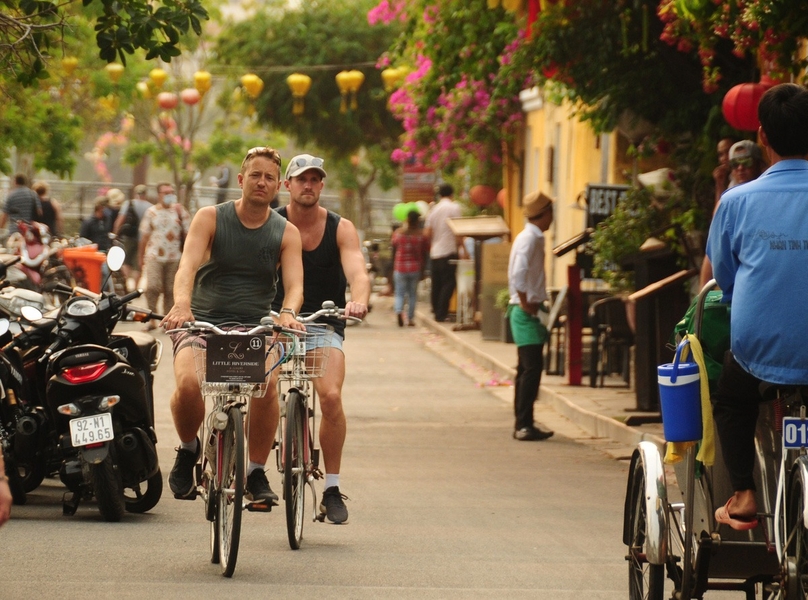AI can boost Vietnam’s international tourist revisit rate
From real-time translation to culturally aware digital assistants and personalized tourism experiences, AI technologies can make Vietnam more accessible, engaging, and memorable for international visitors, writes Dr. Nuno Ribeiro, a senior lecturer in tourism and hospitality management at RMIT University Vietnam.

Dr. Nuno F. Ribeiro, a senior lecturer in tourism and hospitality management at RMIT University Vietnam. Photo courtesy of RMIT.
Vietnam's tourism industry has made remarkable strides since Covid-19, with international arrivals near pre-pandemic levels. However, a critical challenge persists: the country's international tourist revisit rate remains low, hovering below 10%, in contrast with countries such as Malaysia and Thailand.
More than a quarter (28%) of travellers who visited Thailand in 2023 said they intend to return over the next 12 months. For cultural tourists (a market segment that Vietnam aims to attract), intention to revisit is even greater, at 59.42%.
The reasons for this disparity are complex. They can include anything from the attractiveness of destinations to the convenience of transportation, human resource training, cultural and language barriers, the quality of accommodation, and the availability of tourism infrastructure.
Among the factors, there are four important areas where AI can emerge as a powerful tool to address existing challenges: tackle language barriers, bridge cultural gaps, enhance service quality, and elevate the tourist experience.
Overcoming the language barrier with AI-powered translation
The Vietnamese language, with its complex tonal system, unique script, and distinct grammar, presents a challenge for most international visitors. Outside of major tourist hubs, tourists might have trouble communicating or navigating without a command of the local language. This linguistic hurdle extends beyond mere communication difficulties, leading to cultural misunderstandings and a sense of disconnect from local experiences.
Advanced AI translation tools can significantly reduce language barriers via utilizing deep learning models, these systems can provide near-instantaneous, context-aware translations between Vietnamese and numerous languages. This technology can be integrated into mobile apps, wearable devices, and even augmented reality (AR) glasses, allowing for seamless communication in various settings.
AI systems that combine visual and audio inputs can translate not just spoken language, but also text on signs, menus, and documents. This helps tourists navigate and understand their surroundings more effectively.
Advanced AI models can be trained to recognize and explain cultural nuances in language, helping tourists understand subtle meanings, idioms, and context-dependent expressions that are crucial for deeper cultural engagement.
Some of these AI tools are already under development in Vietnam. For example, the Information Technology Institute under the Vietnam Academy of Science and Technology has developed AI-based advanced machine translation technology that translates from Vietnamese to regional languages including Lao, Khmer, Thai, Malay and Indonesian, and vice versa, as well as English.
In another example, Samsung Research & Development Institute Vietnam (SRV) has successfully trained its AI model to recognize even the most subtle differences in the Vietnamese language, with great potential for tourism development.

Foreigners cycle in the ancient town of Hoi An, Quang Nam province, central Vietnam. Photo courtesy of Tuoi Tre (Youth) newspaper.
Navigating cultural complexity with personalized cultural intelligence assistants
Recent research conducted in Binh Thuan province showed that cultural contact directly impacts both satisfaction and revisit intention among international tourists.
Vietnamese culture can be intricate and sometimes perplexing for foreign tourists. Navigating social norms, etiquettes, and cultural nuances can be overwhelming, potentially leading to misunderstandings or missed opportunities for deeper engagement.
AI-driven digital companions can serve as cultural guides, offering personalized insights and recommendations. These assistants can learn from user interactions and preferences, providing increasingly relevant cultural information and advice over time.
By integrating GPS data, calendar information, and real-time event updates, these AI assistants can offer timely and location-specific cultural insights, enhancing the tourist's understanding and appreciation of their surroundings.
Virtual cultural mentors: Using natural language processing and generation, these AI systems can engage in dialogue about Vietnamese culture, history, and customs, offering a more interactive and engaging learning experience.
AI-generated tourism assistants have already been developed in Vietnam. For example, in Can Tho, a major city in the Mekong Delta, researchers and authorities have developed and implemented an AI-powered website and app to provide tourist recommendations since 2019. This system offers suggestions for attractions, accommodations, and activities based on user preferences.
Elevating hospitality staff quality though AI-enhanced training
Recent studies show that whereas approximately 20,000 students graduate from travel, tourism, and hospitality programs in Vietnam annually, the industry requires a minimum of 40,000 trained professionals each year to meet its growing needs.
This shortage has direct implications on service quality and consistency, which are crucial factors in producing memorable tourist experiences, which in turn encourage repeat visits.
Addressing this shortage, AI can revolutionize training programs for tourism and hospitality professionals. AI algorithms can analyze individual staff members' strengths and weaknesses, creating tailored training programs that focus on areas needing improvement, particularly in cross-cultural communication and understanding.
AI-powered VR scenarios can provide immersive training experiences, allowing staff to practice handling diverse cultural situations and improving their intercultural competence. Continuous assessment and feedback: AI systems can monitor staff-guest interactions, providing real-time feedback and suggestions for improvement, ensuring consistent high-quality service across the industry.
Curating personalized cultural experience through predictive analytics
Researchers from RMIT campuses in Vietnam and Australia have recently secured funding to develop augmented reality (AR) experiences aimed at enhancing tourism experiences along the Kenh Te canal in HCMC.
These innovations include AI-powered guided walking tours along the canal banks in Districts 4 and 7. This is just an example of how AI can help create more satisfying and culturally rich experiences.
Dynamic experience recommendations: AI systems can continuously update their recommendations based on real-time data, such as weather conditions, local events, and crowd levels, ensuring tourists always have access to optimal cultural experiences. By analyzing online reviews, social media posts, and direct feedback, AI can help identify areas where cultural experiences can be enhanced, allowing for rapid iteration and improvement of tourism offerings. By analyzing vast amounts of user data, AI can identify patterns in tourist preferences, allowing for the creation of highly personalized itineraries that align with individual cultural interests and learning styles.
The integration of AI technologies in Vietnam's tourism sector goes beyond merely addressing current challenges; it positions Vietnam at the forefront of innovation in Southeast Asian tourism. This tech-forward approach could elevate Vietnam from a one-time destination to a world-class tourism hub that visitors return to again and again.
Looking ahead, AI's potential in Vietnam's tourism sector can be extended to address critical workforce challenges.
- Read More
Malaysia’s e-commerce revenue rises sharply
Malaysia’s e-commerce revenue for the first nine months of 2025 totalled MYR937.5 billion ($226.8 billion), up 1.9% compared to the same period in 2024, according to the Department of Statistics Malaysia (DOSM).
Southeast Asia - Mon, December 1, 2025 | 10:31 pm GMT+7
Vietnam’s benchmark VN-Index climbs above 1,700 points
VN-Index, which represents the Ho Chi Minh Stock Exchange (HoSE), rose past the 1,700-point mark in the first trading session of December, supported mainly by gains in VIC (Vingroup), VPL (Vinpearl), and VHM (Vinhomes).
Finance - Mon, December 1, 2025 | 5:13 pm GMT+7
Samsung Vietnam appoints its first Vietnamese senior executive
Samsung Vietnam has appointed Nguyen Hoang Giang as vice president of Samsung Electronics Vietnam Thai Nguyen (SEVT), marking the first time a local national has been named to such a senior leadership position at a manufacturing unit of the company in Vietnam.
Companies - Mon, December 1, 2025 | 4:30 pm GMT+7
Vietnam to apply Euro 1 emission standards to pre-1999 cars from next March
Vehicles manufactured before 1999 in Vietnam must meet Level 1 emissions standards (equivalent to Euro 1) from March 1, 2026, according to a new government decision.
Economy - Mon, December 1, 2025 | 2:55 pm GMT+7
Aeon breaks ground on $38 mln shopping mall in Vietnam's Mekong Delta province Dong Thap
Japanese-invested Aeon Vietnam on Saturday broke ground for a VND1 trillion ($37.95 million) shopping mall project in the Mekong Delta province of Dong Thap, southern Vietnam.
Industries - Mon, December 1, 2025 | 1:46 pm GMT+7
EV makers in Vietnam likely to be exempted from battery collection, recycling requirements
Manufacturers of electric vehicle batteries in Vietnam are likely to be exempted from collection and recycling responsibilities, as producers currently do not have battery waste to recycle.
Economy - Mon, December 1, 2025 | 10:14 am GMT+7
Confidence in a new cycle for Vietnam’s stock market
Financial expert Huynh Hoang Phuong believes that Vietnam’s market status upgrade from "frontier" to "second emerging", set to be effective from September 2026, will provide an important foundation for the stock market to enter a new development cycle - one filled with many opportunities but also challenges.
Finance - Mon, December 1, 2025 | 6:59 am GMT+7
Malaysia leads Southeast Asia’s digital economic growth
Malaysia is now the fastest-growing digital economy in Southeast Asia with a year-on-year increase of 19%, and on track to reach $39 billion in gross merchandise value (GMV) this year, according to the 10th edition of the e-Conomy SEA Report 2025.
Southeast Asia - Sun, November 30, 2025 | 4:19 pm GMT+7
'K-pop Father' Lee Soo-man to build $99 mln entertainment-tourism complex in central Vietnam
South Korean producer Lee Soo-man, known as the “Father of K-pop,” plans to invest nearly VND2.6 trillion ($98.62 million) in a cultural, sports, recreation, commercial and tourism complex in Gia Lai province through Blooming Sky Co., Ltd.
Real Estate - Sun, November 30, 2025 | 12:09 pm GMT+7
Thailand’s WHA seeks special mechanisms for two industrial zone projects in central Vietnam
WHA Industrial Zone Nghe An, a unit of WHA Group - Thailand's leader in fully-integrated logistics and industrial facilities solution - has submitted a proposal to Nghe An province authorities seeking to have its projects included in the list of those eligible for special mechanisms.
Industrial real estate - Sun, November 30, 2025 | 10:07 am GMT+7
Steelmaker Nam Kim to explore tin-nickel coated steel production for EV battery shells
Nam Kim Steel JSC (HoSE: NKG), a leading coated‑steel manufacturer in Vietnam, plans to research production of tin‑coated steel for the packaging industry, and tin‑nickel coated steel for electric‑vehicle battery shells, serving both domestic and export markets.
Companies - Sun, November 30, 2025 | 8:00 am GMT+7
Cutting logistics costs to global average could save $45 bln a year for Vietnam: PM
Prime Minister Pham Minh Chinh said Vietnam could save $45 billion annually if it lowers logistics costs by around 16% to match the global average.
Economy - Sat, November 29, 2025 | 6:48 pm GMT+7
Coca-Cola Beverages Vietnam loses lawsuit against local tax authority
The Ho Chi Minh City People's Court on Thursday dismissed a lawsuit filed by Coca-Cola Beverages Vietnam against the Ministry of Finance's Department of Taxation, thereby upholding the department's decision to collect back taxes and impose a fine of over VND821 billion ($31.14 million) in total.
Finance - Sat, November 29, 2025 | 2:27 pm GMT+7
Honda Vietnam rejects information Honda Mobilityland plans 600-ha tourism, entertainment, sports complex in southern Vietnam
Honda Vietnam on Friday rejected the information that Honda Mobilityland Corporation, a subsidiary of Japan’s Honda Motor Co., plans to build an international circuit in Tay Ninh province, towards developing a 600-hectare tourism, entertainment, and sports complex there.
Industries - Sat, November 29, 2025 | 10:23 am GMT+7
Vietnam's largest tungsten mine has updated planning okayed
Vietnam’s Nui Phao mine, one of the world’s largest tungsten deposits outside China, has had its updated planning approved under a decision signed by Deputy Prime Minister Tran Hong Ha.
Economy - Sat, November 29, 2025 | 9:34 am GMT+7
Foreign-backed Arque Degi to build $322 mln floating tourism-urban projects in central Vietnam
Authorities in Gia Lai province have granted an investment certificate to Arque Degi JSC to develop three floating tourism-urban projects worth a combined VND8.5 trillion ($322.42 million) in the De Gi lagoon area.
Real Estate - Sat, November 29, 2025 | 8:00 am GMT+7
- Opinion























